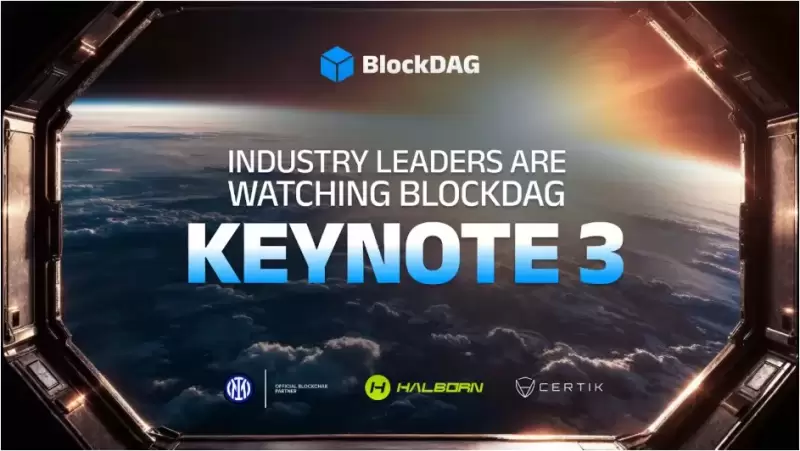 |
|
 |
|
 |
|
 |
|
 |
|
 |
|
 |
|
 |
|
 |
|
 |
|
 |
|
 |
|
 |
|
 |
|
 |
|
Cryptocurrency News Articles
Consensys Legal Challenge to SEC's Crypto Crackdown
Apr 26, 2024 at 03:34 am
In a 34-page lawsuit, Consensys argues that the SEC's attempt to assert jurisdiction over Ethereum is unlawful and threatens blockchain technology. The SEC's actions, including issuing subpoenas to entities related to the Ethereum Foundation and targeting staking on Ethereum, have drawn industry criticism for lacking clear regulatory guidance. Consensys's complaint seeks to establish Ethereum as a non-security, MetaMask as a non-broker dealer, and to prevent the SEC from investigating Ethereum as a security. The lawsuit is part of a broader crypto industry strategy to challenge SEC actions in the Fifth Circuit Court of Appeals and potentially seek Supreme Court review.

SEC's Aggressive Crypto Enforcement Campaign Faces Legal Challenge from Consensys
Consensys, a leading blockchain technology company, has filed a comprehensive 34-page lawsuit against the United States Securities and Exchange Commission (SEC), alleging that the agency's efforts to assert jurisdiction over Ethereum constitute an illegal overreach that threatens the very fabric of blockchain technology.
In its complaint, Consensys argues that the SEC's assertion that Ethereum is a security is not only erroneous but also poses a grave danger to the Ethereum network and the broader blockchain ecosystem.
Unlawful Seizure of Authority
Consensys contends that the SEC's attempt to regulate Ethereum as a security is a clear violation of the law. The complaint states that "the SEC's unlawful seizure of authority over ETH would spell disaster for the Ethereum network, and for Consensys. Every holder of ETH, including Consensys, would fear violating the securities laws if he or she were to transfer ETH on the network. This would bring use of the Ethereum blockchain in the United States to a halt, crippling one of the internet's greatest innovations."
Gensler's Aggressive Enforcement Campaign
The lawsuit comes amid an increasingly aggressive enforcement campaign by the SEC against leading companies in the cryptocurrency sector. Chair Gary Gensler has led this campaign, which has included a series of subpoenas and Wells Notices targeting firms and developers associated with the Ethereum Foundation.
Industry Anger and Lack of Clarity
Gensler's tactics have drawn the ire of many in the crypto industry, who argue that the SEC has failed to provide clear regulatory guidance tailored to the unique characteristics of blockchain technology. Gensler has dismissed these concerns, asserting that existing securities laws are sufficient and that the industry should simply comply with them.
Ethereum's Non-Security Status
The controversy over Ethereum is particularly contentious given the SEC's prior statements that Ethereum, like Bitcoin, is not a security. In 2018, a senior SEC official declared that Ethereum had become "sufficiently decentralized" to fall outside the agency's jurisdiction. Furthermore, the agency approved Ethereum futures trading last year, implicitly acknowledging Ether's status as a commodity.
Gensler's Recent Focus on Staking
Despite these precedents, Gensler has recently shifted his focus to Ethereum's staking feature as a potential basis for asserting jurisdiction. Staking, introduced in September 2022, replaced energy-intensive mining with a system where validators pledge collateral to participate in the validation process.
Consensys' Preemptive Lawsuit
Consensys' lawsuit follows the SEC's issuance of a Wells Notice earlier this month, indicating the agency's intent to sue. Additionally, the SEC contacted Consensys via phone, alleging that its MetaMask platform was operating as an unlicensed broker dealer due to its staking functionality.
MetaMask and Staking
Consensys vigorously disputes the SEC's characterization of MetaMask. The company argues that the platform merely facilitates Ethereum staking on behalf of users, a process that involves pledging collateral to become a validator. Consensys founder Joe Lubin called the SEC's theory that staking transforms Ethereum into a security "preposterous."
Lubin's Concerns
Lubin further expressed concern that Gensler's legal position is part of a broader strategy to stifle crypto growth and block pending applications for spot ETFs based on Ethereum, following the success of Bitcoin ETFs. He accused the SEC of attempting "to regulate a technology on its merits," "stifle certain kinds of innovation," and prevent capital from flowing into the crypto ecosystem.
Legal Strategy
Consensys has filed its lawsuit in Texas, aligning with the crypto industry's strategy of seeking favorable rulings in the U.S. Court of Appeals for the Fifth Circuit, which has historically been more skeptical of agency overreach. A favorable judgment could pave the way for an appeal to the Supreme Court.
Potential Remedies
Beyond declaring Ethereum a non-security, Consensys' lawsuit also seeks to obtain rulings that MetaMask is not a broker dealer, that the SEC is violating the Administrative Procedures Act and the due process clause of the Constitution, and that the SEC be barred from investigating Ethereum as a security.
Disclaimer:info@kdj.com
The information provided is not trading advice. kdj.com does not assume any responsibility for any investments made based on the information provided in this article. Cryptocurrencies are highly volatile and it is highly recommended that you invest with caution after thorough research!
If you believe that the content used on this website infringes your copyright, please contact us immediately (info@kdj.com) and we will delete it promptly.
-

-

- The Hyperliquid (HYPE) future continues to shine as the decentralized exchange breaks past $1 trillion in trading volume
- Apr 11, 2025 at 10:25 am
- The Hyperliquid (HYPE) future continues to shine as the decentralized exchange breaks past $1 trillion in trading volume, offering unmatched speed and full anonymity
-

-

- Rexas Finance (RXS) is at a crossroads, with investors wondering if the price will rise above $0.50 or fall under $0.05.
- Apr 11, 2025 at 10:20 am
- DOGE is now trading at $0.17, near key support levels. Analysts are paying great attention to price fluctuations, as the Falling Wedge pattern and Stochastic RSI crossing provide conflicting signals.
-

-

-

- BlockDAG (BDAG) picks up speed, launching $30m grants program and partnering with SpaceDev to shape the next era of blockchain.
- Apr 11, 2025 at 10:10 am
- Learn what's shifting in Ethereum analysis, what's behind PI coin's fall, and how BlockDAG's SpaceDev deal and $30m grants shape the next era of blockchain.
-

-


















![🐢Super Mario World Koopa Troopa 100% 96⭐️ + Coin [Ao Vivo] 🐢Super Mario World Koopa Troopa 100% 96⭐️ + Coin [Ao Vivo]](/uploads/2025/04/10/cryptocurrencies-news/videos/super-mario-koopa-troopa-coin-ao-vivo/image-1.webp)









































